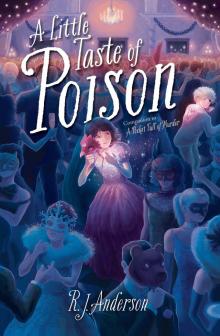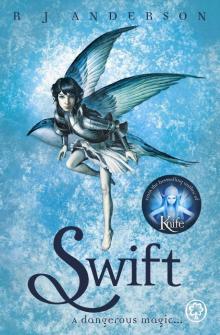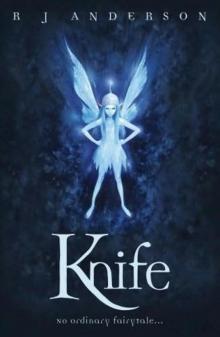- Home
- R. J. Anderson
Ultraviolet Page 3
Ultraviolet Read online
Page 3
I’d killed Tori Beaugrand. Torn her into a billion pieces, disintegrated her, with nothing but the power of my mind.
TWO (IS RED)
It couldn’t have happened the way I remembered. It wasn’t possible. People didn’t just make other people disintegrate, except in superhero comics and sci-fi movies.
And yet the proof of what I’d done had been right there on the news: Tori Beaugrand, missing without a trace. And implausible or not, I knew what I’d seen . . . what I’d done.
But how? How could I have done that to her? I’d never imagined anything to compare to the stark terror on Tori’s face, the shriek that seemed torn from every atom in her body, as she began to dissolve. If I’d had even the tiniest suspicion that there was power like that inside me, that I could annihilate another human being with just a careless thought, I’d have run straight to the nearest hospital and begged them to do something, anything, to take that power away.
Even if it meant losing your colors? asked a sly voice in my mind. Even if it meant never tasting a sound again?
No, not that; the idea was unbearable. Surely it wouldn’t come to that. Why would my unusual senses have anything to do with this terrible new power inside me?
And yet when I remembered how I felt right after Tori disappeared, it seemed like the two things had to be connected, no matter how much I wanted to deny it. As Tori’s last scream faded I’d collapsed to the pavement, smashed flat by a crippling weight of sensation. Suddenly I could sense everything, touch and taste and sight and sound and smell amplified beyond anything I’d ever felt before. Every millisecond had its own scent; every noise for kilometers rushed into my vision. It was too much, too fast, too intense—and between that and the shock of having killed Tori, I’d lost it completely.
Fifteen minutes later I’d stumbled up the driveway to my house, sobbing and clawing at my hypersensitive skin, my knuckles smeared with Tori’s blood and my fingers sticky with my own. All I’d wanted was to crawl into my bed and hide from the world. But my mother had called the police, and they’d come and taken me to hospital, where I’d been strip-searched, sedated, and finally strapped to a bed in an isolation room. No wonder my conscious mind had finally decided that enough was enough, and shut down.
But now I remembered everything—and I had to force myself to keep remembering, no matter how painful it might be. I couldn’t bring Tori back to life again, no matter how hard I wished for it; I couldn’t even take responsibility for her murder, though God knew I’d tried. But somewhere in my past there must be an explanation for what I’d done to her, and I had to find it. If I couldn’t fix what I’d done, I could at least try to make sure it never happened again . . .
“Welcome to seventh grade, class. As you can see on the board, I’m Ms. Pocalujko—it’s a hard name to spell, and I won’t mind if you get it wrong at first.” My new teacher was young and pretty, with auburn curls and a quick, nervous smile. “Most of you here probably know each other already. . . .”
Most of us did, having gone to Diefenbaker Public since kindergarten. But as Ms. Pocalujko rambled on, I glanced around and noticed a few twelve-year-olds I hadn’t seen before. On my left, a baby-faced Asian boy who kept pushing his glasses up his nose. Behind him, a girl with a tight ponytail and a slack chin. And when I looked to my right—
I stared. I couldn’t help it. I’d never seen hair that golden except in shampoo ads, and her eyes weren’t blue, they were turquoise. She had flawless peach-tinted skin with just a hint of summer brown, and her clothes were stylish enough to have come from Toronto, or even New York. She caught me looking at her and gave a demure little smile, like an actress on the red carpet. Then she turned back to face the teacher.
I looked away, blood scalding my cheeks. My hair hung flat, the color of cream of tomato soup made with too much milk, and my eyes were dull as rainwater. As for my skin—well, I might have spent the summer under a rock, if it weren’t for all the freckles. And where the new girl had curves, I had only angles and despair. It was going to be an effort not to hate her.
At last Ms. Pocalujko wrapped up her introduction and started handing out textbooks. I could sense the numbers glowering at me even before I opened the cover, and braced myself for another year of mathematical combat. But the new girl sat up eagerly, and when the problems went up on the board, she was one of the first to respond. Her hand rose in a smooth, confident motion, and as her loose sleeve fluttered back, I noticed a peculiar sun-shaped mark just above her elbow. It was only a half-shade darker than her tan, too subtle for a tattoo and too pink for henna. A birthmark?
She must have sensed my eyes on her, because when she glanced back her expression was no longer friendly. Our eyes locked—and my head filled with a faint, high-pitched buzz, as though a mosquito were hovering just outside my ear. Rusty spots splattered my vision, and a bitter taste spread across my tongue. I blinked, swallowed, and shook my head, but the noise refused to go away.
For the next hour, my math exercises sat untouched as I fidgeted and gnawed at my fingernails, unable to concentrate. My gaze kept sliding back to the girl with the mark on her arm, and every time the droning in my head got louder. And judging by the way she shifted her shoulders and edged around in her seat, my stare was unsettling her almost as much as the noise she made bothered me.
But no one else seemed to hear it. It was my own private torture. Even once we’d moved on to geography, I found it impossible to focus, and when the lunch bell finally rang I bolted up from my seat, half-wild with the urge to escape. But my classmates moved just as quickly, jostling and chattering and crowding the door, and before I knew it I was jammed up against the new girl, who looked at me with eyes cold as a glacier lake.
“Why do you keep staring at me?” she demanded.
“I’m not,” I said, but the words came out all prickly, like baby porcupines. The shrilling in my ears was louder than ever. I backed away and bumped hard into one of the desks. Orange bloomed across my vision, but through it I could still see the angry puzzlement on the new girl’s face. She whirled and stalked out.
“Is there a problem?” asked Ms. Pocalujko from behind me.
The Noise was fading—no, it was gone. I let out my breath. “No,” I said.
“You seemed very distracted this morning,” my teacher said. “I hope you don’t plan to make a habit of staring at your fellow students instead of doing your work.”
Humiliation washed over me. I’d always been a good student, or at least a hardworking one: it was one of the easier ways to keep my mother happy. But how was I going to pass any of my subjects this year, if I had to listen to that noise drilling through my head?
“Sorry,” I said. “I’ll try to do better.” Then as Ms. Pocalujko’s frown softened, I mustered the courage to ask, “That new girl, the one I bumped into . . . what’s her name?”
“Victoria Beaugrand,” said my teacher. “But if you’re curious about her, then maybe you should try talking to her.Outside of class.”
I forced a smile. “Thanks. I’ll do that.”
But I never did.
Back in the present, I slid off the edge of the bed and leaned my head back against the mattress, dizzy with the intensity of my recollection. I’d always had a good memory, but this. . . . I hadn’t been remembering that day so much as reliving it. I could still hear the Noise shrilling in the back of my brain, and it hurt.
But there’d been nothing in that memory to tell me why I’d disintegrated Tori. It was going to take time and persistence to figure out what had happened, and I could only hope that I wouldn’t hurt anybody else in the meantime. Because if I lost control of myself again, with that much power inside . . . who was going to stop me?
I would have called Constable Deckard, if I’d thought it would help. I would have told him everything. But I had no evidence to back up my story, no way of convincing him to believe the unbelievable. In the first few delirious, pain-filled hours after Tori’s death, I’d confessed to
killing her any number of times. I’d told my mother, the police, the doctors at St. Luke’s. But they’d all thought I was out of my mind, and who could blame them?
Although . . . Constable Deckard seemed to think that I knew something about the Tori Beaugrand case. He probably knew I’d been the last person to see her before she disappeared; he might even suspect that I’d killed her. But with no body and no weapon, no reason yet to believe that Tori might not still be alive, he couldn’t prove I’d been responsible for her death any more than I could.
Or at least I hoped he couldn’t. I didn’t want to go to jail; just the thought of it made goosebumps break out all over my skin. But once the police finished their investigation, I was afraid that I might end up there anyway. They’d swabbed my hands when they arrested me, and taken my grandmother’s ring for testing—if they found the blood was Tori’s, wouldn’t that be enough to charge me with assault, at the very least?
If only I knew someone I could talk to. Someone who would not only listen to my story but believe it, and help me decide what to do. But that was too much to ask of anyone, even my father or my best friend Melissa. Unless they’d seen Tori disintegrate for themselves, they’d never be able to accept that I was telling the truth.
Her body contorted, her eyes wide with shock and horror—
“I’m sorry,” I whispered. “I’m so sorry.”
But it didn’t make me feel any better.
. . .
I spent the rest of the afternoon trying to sleep, without much success. The nurses kept looking in on me, and there were too many sounds from the corridor—bursts of high-pitched laughter, blue hisses and yellow mutters, the rubbery squeaks of shoes and wheels—for even my drug-fogged senses to ignore.
At suppertime, a burly aide named Ray tried to get me to eat in the kitchenette with the other Red Maple patients. I told him I had a migraine, and he took pity on me. He brought me a paper plate with a slab of battered fish, some soggy coleslaw, and a few withered-looking fries. The plastic cutlery was so flimsy I could barely eat with it. I forced down a few mouthfuls, then lay down and pulled the blankets over my head again.
“. . . Hey, Alison, it’s nine o’clock. Time for your meds.”
I didn’t feel like I’d slept, but I must have. I turned over, wincing at the sudden trumpet flourish of light. Ray stood in the doorway, one hand on the switch. “I’ll show you where to go,” he said. “You can get something to help you sleep better too, if you want.”
I worked my tongue around my dry mouth. My stomach still felt queasy, but my headache was gone. “I . . . don’t really want any more pills.”
“Okay,” Ray said. “But you still need to take your meds. Doctor’s orders.”
You don’t understand, I wanted to say. I can’t go out there with the other patients. What if I lose control, and end up doing to one of them what I did to Tori?
But he wouldn’t understand, and I didn’t want to make him drag me out. So I took a slow, calming breath and followed Ray into the corridor, where a nurse was waiting with the medicine cart. About seven male and female patients—some barely more than children, others looking old enough to be shipped off to an adult facility any day now—had formed a ragged line, with a couple of watchful aides on either side. My heart stuttered at the sight of the girl with the inky spikes of hair, hunched at the end of the line. If I joined the group, I’d be right behind her.
“Don’t be shy,” Ray rumbled, nudging me forward. Then he raised his voice and said, “Hey, guys, this is Alison. Say hello.”
“Hi!” blurted one of the younger boys, but the others mostly ducked their heads and muttered, or gave no sign of noticing me at all. One by one they shuffled up to take their medication, then turned and headed back toward the TV’s Technicolor blare. The ink-haired girl snatched her cups from the nurse’s hand and slammed them back like a double shot of whiskey, then gave me a contemptuous glare before dropping them into the trash and stalking away.
“Never mind Micheline,” said Ray, taking my cups from the nurse and handing them to me. “She acts tough, but she’s a good kid really. Sure you don’t want that sleeping pill?”
The corridor was clear now, the other patients safely gone. I looked at the pills in my cup. “No, thanks,” I said, and swallowed them.
. . .
“Good morning, Alison. My name is Shabnam. Please—” The middle-aged woman extended an elegant hand—“sit down.”
We were in a little office next to the nurses’ station, with the door propped open for security’s sake. Self-conscious in my hospital pajamas, especially compared to Shabnam’s silken headscarf and crisply pressed slacks, I took a seat.
“Now, this is the first time you’ve been able to meet with a rights adviser, isn’t that so?”
Her lilting voice rippled like sunlight on water, making mesmerizing patterns in front of my eyes. It took me a few seconds to remember that we were supposed to be having a conversation. “What? Oh. Yes. Sorry.”
“There is no need to apologize,” she said. “I’m here to help you understand your situation, and what your rights are under the Mental Health Act. You see—” She folded her hands and leaned across the table—“you were admitted to St. Luke’s Hospital as an involuntary patient, which means that a doctor found you to be in danger of causing serious bodily harm to yourself or to others. You were also found incapable of consenting to treatment, so a substitute decision maker—in this case, your mother—gave permission for you to be treated with antipsychotic medication.”
None of that came as any surprise, but I wondered where my father had been during all of this. Had he ever questioned my mother’s decision? Or had he just retreated into his shell, like he usually did when the two of them disagreed, and let my mother do whatever she thought best?
“After you had been in the hospital for seventy-two hours,” Shabnam continued, “your involuntary status was renewed for another two weeks, since you were still deemed unable to understand your situation or make informed decisions about your care. During that time your mother applied to have you transferred to Pine Hills, and it was agreed that this transfer would be in your best interests, so that is why you are now here. Now, I have a form to give you.”
She slid a sheet of paper across the table. “This is a notice to let you know that your new psychiatrist, Dr. Minta, has completed a certificate of renewal, which will authorize him to keep you here as an involuntary patient for another four weeks.”
I stared down at the paper, willing the words to stop wriggling and let me read them. I am of the opinion that the patient is suffering from mental disorder of a nature that likely will result in serious bodily harm to the patient, and/or serious bodily harm to another person, unless he or she remains in the custody of a psychiatric facility. . . .
“So this means,” I said slowly, “that I’m stuck here until the end of July?”
“Possibly,” she said. “However, you have the right to be informed of Dr. Minta’s reasons for his decision. And you also have the right to appeal, and ask that your involuntary status be revoked.”
My stomach turned over. I knew I was supposed to be here for my own safety and the protection of others, but I was far more likely to get into trouble at Pine Hills than I was at home. Here I was trapped and stressed out and surrounded by unpredictable people, with nowhere to escape if things got too much for me. But if I could get out of this place, and go somewhere safe and quiet where I could be alone . . .
“If I did appeal, how would that work?” I asked.
“Once they receive your application,” said my adviser, “the Consent and Capacity Board will arrange a hearing here at the hospital within seven days. You can ask your lawyer to represent you, or I can help you apply for legal aid.”
That sounded good. I’d been hoping to talk to a lawyer anyway, if only to answer my questions about the police. “And if I win my appeal?”
“Then your status would be changed to voluntary,” she said.
“You would be free to refuse treatment if you wish, and leave the hospital at your discretion. But if your appeal is denied, your next hearing would not be for another six months, or until you are on your fourth Certificate.”
“My fourth?” My heart lurched. “You mean my psychiatrist can just keep issuing these things?”
“If he thinks it necessary, yes,” said Shabnam. “As I said, the current Certificate authorizes him to keep you here for one month. The second would last for two months, the third for three months, and so on.”
In my mind’s eye I could see the calendar floating all around me, like a rainbow scarf. To be stuck here for months on end with no privacy and no freedom, forced to take drugs that fogged my mind and grayed my senses, unable to play my keyboard or do any of the other things I normally did to relax . . . How long would it be before the stress got too much for me, and I did to somebody else what I’d done to Tori?
I couldn’t let that happen. I straightened up in my chair.
“All right,” I said. “I want to appeal.”
. . .
I learned a few things, that first day on Red Maple. One was that the other patients didn’t bother with the “Maple” part; to them it was just Red Ward, the place where everything stopped. Being in Red Ward meant you’d been “acting out” or were otherwise seriously unstable; you were an escape risk, or you were on suicide watch, or just too volatile to be trusted without close supervision. So once you’d had breakfast and taken your meds, you could play cards or board games in the lobby, and if you’d earned the privilege (which I hadn’t) you might get ten or fifteen minutes in the courtyard before lunchtime. You’d have a short meeting with your psychiatrist or one of the nurses, and then at four P.M. an aide would turn on the TV. But that was pretty much all. No wonder the other patients seemed frustrated and depressed.

 Quicksilver
Quicksilver Knife
Knife Arrow
Arrow Ultraviolet
Ultraviolet Wayfarer
Wayfarer A Little Taste of Poison
A Little Taste of Poison Nomad
Nomad Torch
Torch Rebel fr-2
Rebel fr-2 Swift
Swift Faery Rebels
Faery Rebels Spell Hunter fr-1
Spell Hunter fr-1